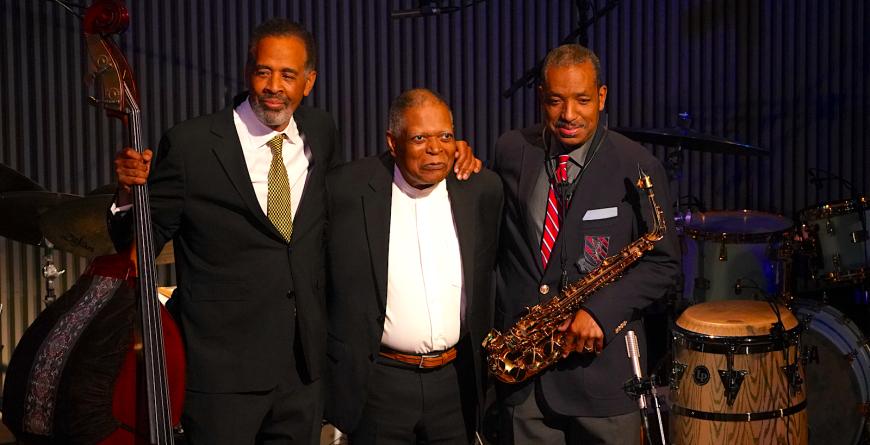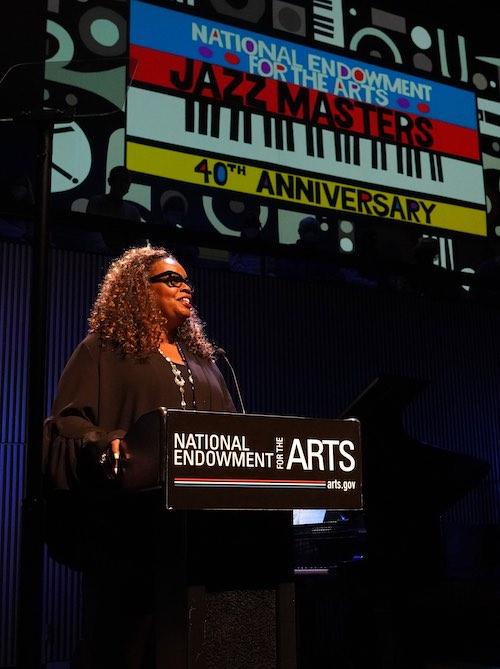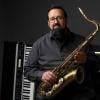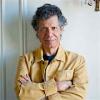
Two years after SFJAZZ was slated to present the National Endowment for the Arts Jazz Masters Tribute Concert, the organization finally got the chance to throw the party in person. Presided over with warmth and grace by vocalist Dianne Reeves, Thursday’s celebration at the SFJAZZ Center efficiently honored four exceptional musicians while also capturing much of what makes jazz such an essential part of the American story.
It’s the first time the event has been held on the West Coast, and after SFJAZZ’s well-produced virtual editions in 2020 and 2021 the concert felt like a family reunion. Again and again, the musicians highlighted the ways in which the art form has thrived over the generations within an intertwined community of practitioners. The fact that the three honorees present — drummer Billy Hart, bassist Stanley Clarke, and saxophonist Donald Harrison Jr. — effortlessly formed an ensemble provided one of the evening’s highlights, but that was at the end of the show.
The two-hour event, which was also livestreamed, included artfully shot video statements by the newly minted Jazz Masters that portrayed them in their studios and, in the cases of Harrison in New Orleans and vocalist Cassandra Wilson in Jackson, Mississippi, deeply enmeshed in their communities. Their concise acceptance speeches, delivered in person except for Wilson’s, tended to emphasize their debt to the giants who came before them and the need to pass on the tradition to the next generation. Their music also spoke eloquently about jazz’s cross-generational imperative.
What was so heartening wasn’t that they’re all still in their prime, playing with nonpareil skill and charisma. It’s that each Jazz Master delivered an idiosyncratic set that reflected their particular vision and values with a working ensemble of younger players rather than an ad hoc all-star combo. Harrison, a guiding force in New Orleans music who has picked up the mantle for a storied Crescent City clan, was awarded this year’s A.B. Spellman NEA Jazz Masters Fellowship for Jazz Advocacy.
Playing with a combustible young band, he distilled the history of jazz into six scorching minutes, racing from Scott Joplin’s “Maple Leaf Rag” to “One for Bird,” his tribute to bebop patriarch Charlie Parker, through his sleek post-bop number “Temporal” to the concluding Latin funk of “The Magic Touch.” Though the 61-year-old Harrison has at times been discounted by critics due to his forays into commercial radio-friendly smooth jazz, the medley offered a potent reminder that there’s not a more fluent, profound, and persuasively swinging altoist on the scene.
Hart, 81, took a different tack, using his turn on stage to play one piece, his strikingly sinuous melody “Duchess” from his quartet’s 2012 debut album All Our Reasons. The drummer embraced bandleading late in his career, and his supple interplay with pianist Ethan Iverson, tenor saxophonist Mark Turner, and bassist Joe Martin (stepping in for Ben Street) embodied the musicality that’s made him such an inspirational and ubiquitous force over six decades.
Known for her honeyed contralto, the 66-year-old Wilson was represented on stage by vocalist Gretchen Parlato, an interesting choice as her lithe, silvery voice contrasts sharply with the honoree. Somehow it worked. Performing with a trio of her SFJAZZ Collective bandmates and acoustic guitarist Brandon Ross, a key Wilson collaborator during her transformation from hard-edged MBASE funk to an Americana palette, Parlato evoked Wilson’s folk/jazz ethos on “Another Country,” the title track from her 2012 collaboration with Italian guitarist, producer and songwriter Fabrizio Sotti.
Stanley Clarke’s set with his quartet was a marvel of rhythmic inventiveness featuring Afghan-American tabla player Salar Nader and Jeremiah Collier on a stripped-down trap set with two cymbals and a snare drum. Focusing on Chick Corea’s “No Mystery,” a piece Clarke introduced with the pianist’s seminal fusion band Return to Forever, the quartet imbued the tune with Corea’s sense of play.
The intergenerational conversation continued with Clarke alone on stage, introducing Duke Ellington’s “Take the Coltrane” with a series of lightning runs up and down the bass. Joined by Hart in duet, they dug into the blues and danced around the 12-bar form. When Harrison joined the fray for several unbridled choruses, the trio delivered liberational promise that jazz embodies.
The music’s spirit manifested well beyond the musical segments. During his acceptance remarks Clarke detoured into a colorful description of the clientele found at the early 1970s East Village jazz mecca Slug’s Saloon. In his video segment, Hart recalled advice he received from Miles Davis — “Play everything in four and don’t finish nothing” — delivered in a fine imitation of the trumpeter’s famous rasp. Hart also contributed the evening’s only note of irreverence, intimating in his acceptance remarks that he wasn’t overawed by official recognition from the government.
Even the pro forma segments felt genuine and soulful. Recently confirmed NEA Chair Maria Rosario Jackson spoke of being introduced to jazz as a child by her father, who wanted his young Black daughter to know about the ingenious artists who cultivated an African-American art form embraced around the world.

Reeves, who received Jazz Master Fellowship honors in 2018, emphasized the tight bonds that link so many musicians, recalling the first time she met Clarke via her uncle, San Rafael-born pianist George Duke, when she was in high school. Describing Hart as one of her mentors, she said that they had made a deal backstage to record together.
As an artist who frequently performs at the SFJAZZ Center, she offered lavish praise for the venue and the organization. And early in the concert she dazzled with a bravura rendition of the standard “I’m All Smiles” accompanied by the SFJAZZ Collective rhythm section of pianist Edward Simon, bassist Matt Brewer, and drummer Kendrick Scott.
The SFJAZZ Collective, augmented by SFJAZZ High School All-Star trumpeter Skylar Tang, kicked off the show with a cold open, walking on stage unannounced for Martin Luther McCoy’s commanding rendition of Marvin Gaye’s “What’s Going On?” with an arrangement by trumpeter Etienne Charles from the ensemble’s recent release New Works Reflecting the Moment. The Collective took the stage again along with Hart, Clarke, Harrison, and other musicians for the rousing closer, the traditional song “St. James Infirmary,” immortalized by Louis Armstrong and His Hot Five in 1928.
Randall Kline, SFJAZZ’s founder and executive artistic director, made a brief introduction, but otherwise he was taking in the show from the room’s top row. On March 22, he announced that he’s stepping down from his role leading the organization in November, 2023. There will undoubtedly be celebrations and tributes for him as SFJAZZ marks its 40th year, but it will be hard to top the Jazz Masters Tribute Concert, an event that looked and sounded fresh and relevant stamped with SFJAZZ’s signature.






